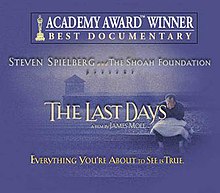The Last Days
| The Last Days | |
|---|---|
 | |
| Directed by | James Moll |
| Produced by | June Beallor Kenneth Lipper |
| Music by | Hans Zimmer |
Production company | |
| Distributed by | October Films |
Release dates |
|
Running time | 87 minutes |
| Country | United States |
| Languages | English, German and Hungarian |
The Last Days is a documentary, directed by James Moll and produced by June Beallor and Kenneth Lipper in 1998. Steven Spielberg was one of the executive producers, in his role as founder of the Shoah Foundation. The film tells the stories of five Hungarian Jews during the Holocaust, also known as the Shoah, focusing on the last year of World War II. The film focuses on the horrors of life in the Nazi concentration camps, but also stresses the optimism and desire to survive of the survivors.[1][2]
The film won an Academy Award for Best Documentary Feature.[1][3] It was remastered and scheduled for wider release in 2021 by Netflix.[1]
Release[]
The Last Days was first released in 1998. It was produced by June Beallor, Kenneth Lipper, Steven Spielberg, and the Survivors of the Shoah Visual History Foundation. The film included archival footage, photographs, and documents, as well as interviews with survivors of the Shoah. The Last Days was remastered and released worldwide on Netflix on May 19, 2021.
Holocaust survivors Bill Basch, Irene Zisblatt, Renée Firestone, Alice Lok Cahana, Tom Lantos, Dario Gabbai, and Randolph Braham are featured in the film.[1] Former Representative Lantos (D-CA) was the only Holocaust survivor ever elected to the United States Congress.[4][5] He was saved by Swedish diplomat Raoul Wallenberg, who hid Lantos in Budapest.[4]
The film also includes interviews with U.S. army veterans Paul Parks and Katsugo Miho, G.I.'s who helped liberate Dachau concentration camp. Former SS doctor Hans Münch, acquitted of war crimes at the Nuremberg trials, was interviewed about his experiences at Auschwitz concentration camp.[2][4]
Critical response[]
The Last Days received positive reviews from film critics. It holds a 92% approval rating on review aggregator website Rotten Tomatoes, based on 24 reviews.[6] On Metacritic, the film holds a 85% approval, based on 25 critics.[7]
According to Radheyan Simonpillai for The Guardian, "The film’s thesis is that the Nazis were so fueled by hatred that they would sacrifice their position in the war in order to carry out the genocide, deporting 438,000 Hungarian Jews to Auschwitz within a six-week period."[1] Roger Ebert wrote for the Chicago Sun-Times that the film "focuses on the last year of the war, when Adolf Hitler, already defeated and with his resources running out, revealed the depth of his racial hatred by diverting men and supplies to the task of exterminating Hungary's Jews."[8] John Leonard wrote for New York Magazine, "It is a story told by five survivors of that fast-forward genocide, all of them naturalized American citizens, who return to the cities and villages from which they were seized, and to the camps to which they were committed."[4]
Marc Savlov for The Austin Chronicle wrote, "Moll's film is a far cry from the elegiac poetry of, say, Night and Fog; it's a document more than an examination, and its power of record is inarguable and incorruptible."[2] Experimental psychologist George Mastroianni, in his Times of Israel Blogs piece discussing The Last Days and a 2010 blog piece by independent scholar Joachim Neander, suggested that "Neander analyzed Zisblatt's testimony and raised concerns about the factual accuracy of some of the elements of her story."[9][better source needed]
Barbara Shulgasser-Parker, former film critic for the San Francisco Examiner, wrote for Common Sense Media, "The horrors described by survivors of the death camps, the soldiers who liberated them, and historians, as well as photographs and archival footage, make this important and educational but best suited to teens and older."[10]
See also[]
References[]
- ^ a b c d e Simonpillai, Radheyan (2021-05-18). "'There is still so much hatred': looking back on Holocaust documentary The Last Days". The Guardian. Retrieved 2021-06-25.
- ^ a b c Savlov, Marc (1999-03-05). "The Last Days". The Austin Chronicle. Retrieved 2021-06-25.
- ^ "New York Times • The Last Days". Movies & TV Dept. The New York Times. 2007. Archived from the original on 2007-12-04. Retrieved 2008-11-22.
- ^ a b c d Leonard, John (2000-05-29). "Speak, Memory". New York. Retrieved 2021-06-25.
- ^ Gorondi, Pablo (2018-02-01). "Statue of late Rep. Tom Lantos unveiled in Hungary". The Mercury News. Retrieved 2021-06-25.
- ^ "The Last Days". Rotten Tomatoes. Retrieved June 25, 2021.
- ^ "The Last Days". Metacritic. Retrieved 2021-06-25.
- ^ Ebert, Roger (1999-02-12). "Reviews: The Last Days". RogerEbert.com. Retrieved 2021-06-25.
- ^ Mastroianni, George R. (2021-08-04). "Questionable testimony in Holocaust doc is grist for deniers". Times of Israel Blogs. Retrieved 2021-09-26.
- ^ Shulgasser-Parker, Barbara (2021-05-26). "The Last Days". Common Sense Media. Retrieved 2021-06-25.
External links[]
- 1998 films
- American films
- English-language films
- American black-and-white films
- American documentary films
- Best Documentary Feature Academy Award winners
- Documentary films about the Holocaust
- The Holocaust in Hungary
- 1998 documentary films
- Films scored by Hans Zimmer
- Films directed by James Moll
- Jewish Hungarian history